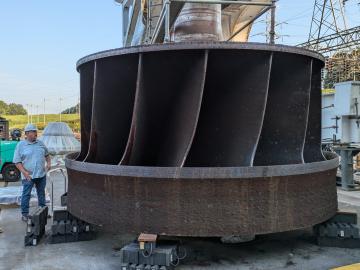
Filter News
Area of Research
- Advanced Manufacturing (10)
- Biology and Environment (34)
- Computational Engineering (1)
- Computer Science (2)
- Electricity and Smart Grid (1)
- Energy Science (91)
- Functional Materials for Energy (1)
- Fusion and Fission (6)
- Isotope Development and Production (1)
- Isotopes (17)
- Materials (66)
- Materials Characterization (1)
- Materials for Computing (8)
- Materials Under Extremes (1)
- National Security (19)
- Neutron Science (22)
- Nuclear Science and Technology (7)
- Quantum information Science (1)
- Supercomputing (26)
News Type
News Topics
- (-) 3-D Printing/Advanced Manufacturing (72)
- (-) Biomedical (34)
- (-) Clean Water (9)
- (-) Cybersecurity (24)
- (-) Grid (28)
- (-) Isotopes (37)
- (-) Materials Science (75)
- Advanced Reactors (16)
- Artificial Intelligence (55)
- Big Data (29)
- Bioenergy (52)
- Biology (57)
- Biotechnology (19)
- Buildings (32)
- Chemical Sciences (52)
- Composites (17)
- Computer Science (93)
- Coronavirus (23)
- Critical Materials (13)
- Education (3)
- Element Discovery (1)
- Emergency (1)
- Energy Storage (61)
- Environment (91)
- Exascale Computing (26)
- Fossil Energy (1)
- Frontier (27)
- Fusion (28)
- High-Performance Computing (57)
- Hydropower (2)
- Irradiation (1)
- ITER (4)
- Machine Learning (27)
- Materials (80)
- Mathematics (5)
- Mercury (6)
- Microelectronics (1)
- Microscopy (31)
- Molten Salt (3)
- Nanotechnology (38)
- National Security (40)
- Neutron Science (71)
- Nuclear Energy (52)
- Partnerships (36)
- Physics (43)
- Polymers (19)
- Quantum Computing (17)
- Quantum Science (40)
- Security (19)
- Simulation (23)
- Software (1)
- Space Exploration (3)
- Statistics (1)
- Summit (26)
- Transportation (49)
Media Contacts

ORNL researchers were honored with a prestigious ACE Award for Composites Excellence by the American Composites Manufacturers Association. The team won the “innovation in green composites design” prize for creating a fully recyclable, lightweight wind turbine blade tip that incorporates low-cost carbon fiber and conductive coating for enhanced protection against lightning strikes.

Researchers at ORNL are using advanced manufacturing techniques to revitalize the domestic production of very large metal parts that weigh at least 10,000 pounds each and are necessary for a variety of industries, including energy.

Justin West, an advanced machining and machine tool researcher at ORNL, has been selected as a recipient of the 2024 30 Under 30 award by the Society of Manufacturing Engineers.

A study led by the Department of Energy’s Oak Ridge National Laboratory details how artificial intelligence researchers created an AI model to help identify new alloys used as shielding for housing fusion applications components in a nuclear reactor. The findings mark a major step towards improving nuclear fusion facilities.

A new technical collaboration program at the Department of Energy’s Oak Ridge National Laboratory will help businesses develop and launch electric grid innovations. Sponsored by the Transformer Resilience and Advanced Components program in DOE’s Office of Electricity, the initiative will provide companies with access to national laboratory resources, enabling them to capture market opportunities.

Distinguished materials scientist Takeshi Egami has spent his career revealing the complex atomic structure of metallic glass and other liquids — sometimes sharing theories with initially resistant minds in the scientific community.
After retiring from Y-12, Scott Abston joined the Isotope Science and Engineering Directorate to support isotope production and work with his former manager. He now leads a team maintaining critical equipment for medical and space applications. Abston finds fulfillment in mentoring his team and is pleased with his decision to continue working.

A team led by scientists at ORNL identified and demonstrated a method to process a plant-based material called nanocellulose that reduced energy needs by a whopping 21%, using simulations on the lab’s supercomputers and follow-on analysis.

ORNL is working with industry partners to develop a technique that combines 3D printing and conventional machining to produce large metal parts for energy applications. The project, known as Rapid Research on Universal Near Net Shape Fabrication Strategies for Expedited Runner Systems, or Rapid RUNNERS, recently received $15 million in funding from DOE.

DOE commissioned a neutron imaging instrument, VENUS, at the Spallation Neutron Source in July. VENUS instrument scientists will use AI to deliver 3D models to researchers in half the time it typically takes.


